- Home
- Nick Carter
Earthfire North Page 10
Earthfire North Read online
Page 10
Carter held his silence, relaxing his body, letting the pain wash over him, through him, not fighting it.
The guard pulled the finger farther back, and the pain worsened. Carter could feel the sweat popping out on his forehead.
Ziegler shook his head sadly, then nodded toward the guard, who pulled the finger the rest of the way back until it popped, the breaking bone sending a huge bolt of pain through the back of Carter's head… almost as if he had received a massive electric shock.
"There are nine fingers remaining. Then the toes. And if all else fails, there are interesting things to be done with your anus, or perhaps even your testicles." Ziegler chuckled.
The guard moved to Carter's ring finger.
"I'll tell you," Carter shouted. "Christ, it's not worth this."
The guard stopped. Ziegler just stared at him.
"Lydia Coatsworth was a close friend of mine. We… were lovers. She sent me a letter telling me she was in some kind of trouble. When she died I went up to see what happened."
The guard pulled Carter's Luger and the stiletto out of his jacket pocket, and handed them to Ziegler. "He was armed with these, Herr General."
Ziegler looked at them, then set the weapons on the desk. "Not CIA." he said thoughtfully. He looked at Carter. "How did you know about this warehouse?"
"Hauptmann told me before I killed him. He told me everything when I threatened to cut his eyes out and leave him there. He told me about you and the Odessa. About the operation up there as well as down here. About this place. About Steuben and Sons. The shipments from Mainz. Everything."
"He's lying, Herr General," one of the guards said. "Victor would never talk like that."
"Perhaps… perhaps not," Ziegler said. "Every man has his breaking point."
"I am a reporter with Amalgamated Press. In Washington, D.C.," Carter said. His entire hand and arm throbbed.
Ziegler looked at him thoughtfully.
"You can check on my credentials."
"Shall I break another finger, Herr General?" the guard asked. His breath smelled of onions.
"No," Ziegler said after a hesitation. "Tonight is the last shipment in any event. It'll be on its way north by tomorrow." He smiled. "Dispose of him. Down the elevator shaft." He picked up the Luger and stiletto, and handed them over to the guards. "Put these back on his body."
"Yes, sir," the guard said. He untied Carter while the other guard stood back, the AK-47 raised, and helped him out of the chair.
Outside, the workmen were finishing their meal. They watched as Carter and the guards headed toward the rear of the building. Carter walked slowly, regaining his strength and balance, making the guard crowd him.
A stairway against the back wall led to a second-floor balcony across from which was a freight elevator. One of the guards held the button, sending the car above the landing, but then he stopped it there and pulled the gate open on the gaping square hole.
"It goes down to the second basement. Forty feet, with steel pilings down there. Very unpleasant."
Carter stood at the edge.
"You should have been more careful around this shaft," the guard said. The other one laughed.
At that moment Carter swung around, shoving the barrel of the gun away in one movement and spinning the guard around with the next, dropping him neatly into the elevator shaft.
The second guard was bringing his gun up as Carter leaped on him, smashing the man's throat with a karate chop. The guard went down, his rifle clattering on the balcony floor.
There was no time to waste, Carter thought. He recovered his stiletto and Luger from the unconscious but still breathing guard, then hurried down the stairs, and up the aisles and rows to where the dead dog still lay.
Using his tiny penlight, it took him only a minute or two to find where the camera had slid beneath one of the pallets. Quickly he pulled back the plastic cover on a big piece of machinery, took several more photographs, then pocketed the camera.
He had gotten what he had come for and more. This equipment was bound for Iceland tomorrow. The connection between Ziegler and what was happening up there was very clear now.
There was a commotion up on the balcony. Someone shouted something from above, and a siren sounded. They had discovered the guard.
He pulled out his Luger and raced toward the far corner of the large warehouse, ducking down aisles and up rows, keeping low and moving as fast as he could.
More dogs were barking from behind him now, and he could hear men shouting even over the howl of the siren.
The service door at the rear of the building was latched from inside. It took him a moment or two to fumble with the locking bar, but then he had it open and he was outside.
A half-dozen men, all of them armed, came around the corner from the front, cutting off any chances he had of making it to where he had parked his car.
Instead, he ducked around the back of the building and raced around to the other side, then went back to the front of the building.
At the corner he peered around. There were several men standing in the big doorway, their backs to him. Straight across from where he stood, the dock was only twenty yards wide, dropping off beside the ship to the water.
He holstered his Luger, took a deep breath and let it out slowly, then bolted from the comer of the building and ran directly across the dock.
He was nearly to the water when someone behind him shouted, "It's him!" But he was over the edge as the first shots were fired.
The water was fifteen feet below the dock, and he hit cleanly, feet first, the cold waters of the Rio de la Plata washing over his head.
He came up swimming, just making it around the bow of the ship before a fusillade of shots sounded from above him on the dock.
He dove deeply this time, swimming away from the ship at right angles. When he came up, the firing was still going on, and there were more sirens sounding in the distance, but it was all behind him.
He struck out across the docks, finally coming to a small diesel-powered fishing boat tied to a dilapidated pier. He climbed up over the side, lay on top of the stinking nets for a few moments to catch his breath, then hot-wired the ignition and swung the boat out into the open water, heading northwest, toward Montevideo.
Seven
The economic information officer to the U.S. envoy in Montevideo felt a buzz of excitement as he ran up the stairs from the basement parking lot under the embassy. He hadn't had a thrill like this since the Cuban Revolution.
Just half an hour ago, when he had come home late from work, had parked his car, and had started up the back walk to his apartment, the intelligence officer had leaped like an apparition out of the garbage dumpster brandishing a gun.
"I don't want to hurt you," the man had said.
The information officer, whose name was Putnam, had worked for the CIA some years ago, and he knew better than to argue with an apparently overwrought man with a gun. They went back to Putnam's car, got in, the man on the floor in the back, and Putnam did as he was told.
As they drove back into town, the man explained what he wanted Putnam to do for him. He had a packet of film, he said, that had to be sent out in the diplomatic pouch immediately. There would be some phone calls he would have to make, but they could wait until Putnam was absolutely sure the embassy was essentially cleared for the night.
In the meantime he needed a first-aid kit, and he would wait in the car while Putnam went up and got it from the dispensary.
"Your name is Robert Putnam," the man said. He gave Putnam a number to call in Washington, D.C., and an index. "Before you do anything, Putnam, check that out."
Putnam gained the top landing of the stairs and found the first floor of the embassy deserted, as was usual at this time of night. Upstairs in communications mere would be the duty officers, but nothing moved down here except the guards.
The guard station was at the front of the building, and the marine on duty looked up as Putnam strode by. But he said
nothing.
Back in the dispensary, Putnam pulled out a first-aid kit, then picked up the telephone, rang up to communications, and had them place the call to Washington. It only took a minute or two, and the phone rang only once before it was answered with the number by a woman.
Putnam gave the index word and number, and the woman described Carter, got the details of who was calling, from where, and the circumstances, then asked Putnam to help in any way he could. She gave a Washington address for the film.
After the call, he went up to communications, leaving the first-aid kit out in the corridor, and handed the film cartridges to the OD, along with the Washington address. "These get sent in the sack first thing in the morning."
"Yes, sir," the young OD said. "But there is one out tonight at midnight."
"That's even better. Get it in that one then, please."
"Yes, sir."
Back out in the corridor, Putnam grabbed the first-aid kit and hurried back down to the parking garage. The woman on the phone had identified the man as Nick Carter. He was lying in the back seat. Putnam helped him out of the car and to the elevator.
"Nearly everyone is gone, sir." he said. "I can get you up to my office without the marines seeing us."
"I may have to stay awhile," Carter said; his tongue seemed thick. "I'll need something to eat and drink."
"Yes, sir." Putnam said. This was great.
They got up to the third floor without incident, and Putnam helped Carter down the corridor and into his office, where he locked the door before he flipped on the light.
It was a tiny cubicle, but it had a small couch along one wall. He settled Carter back on the couch, doused his hand in disinfectant after pulling off the blood-encrusted handkerchief, put a splint on the badly broken finger, and finally bandaged the bites.
He poured Carter a drink of brandy from the bottle in his desk, lit him a cigarette, then sat back and watched him.
"You said you wanted to make some phone calls?" Putnam asked when it seemed as if Carter was beginning to recover.
"Right. Have you sent off my film?"
"It'll leave at midnight tonight. Should be in Washington by late morning. Your… office knows it's coming."
"Do they know where I am?"
"Yes, sir."
Carter sat back with his cigarette, seemed to think a moment, then looked up. He seemed very determined.
"Are you game to help me a bit more, Putnam?" he asked.
"Yes, sir. Anything you say."
"Get me that Washington number again, then take a walk for about five minutes."
"Yes, sir," Putnam said. He got communications again and placed the call. When it started to ring, he handed the phone across and left the office.
The phone was answered immediately.
"Carter, blue bird seven-three-zero."
The line went dead. Two minutes later David Hawk's voice came on. "I just got word you were in Montevideo. Are you all right?"
"A little shaken up. I've sent up some film. You should have it in the morning." Quickly and succinctly Carter told Hawk everything that had happened.
Hawk thought about it for a moment. "Ziegler knows you're after him, and he knows you're obviously not a newsman. It'll make him nervous. Maybe he'll make a mistake or two."
"My thoughts exactly, sir."
"Did you get a good look at the equipment you were photographing?"
"Yes, sir."
"Hang on — I'll put Cairnes on and maybe he can give us some ideas." Moments later the connection was made. Hawk was speaking to the chief of AXE's technical section. "Carter is on the line. He's taken a look at some equipment. See if you can make head or tail of it."
"Go ahead, N3," Cairnes's nasal voice said.
Carter explained in detail everything he had seen in the warehouse.
"A nuclear reactor or reactors, I'd guess," Cairnes said. "The big one was probably a waste water eliminator, standard for a breeder reactor. Steuben and Sons are the biggest manufacturers of that kind of equipment. But…"
"But what, Bill?" Hawk asked.
"That equipment could be for other purposes as well. Steam movement. Hot water transport. Even sewage disposal. Hell, there's no real way of telling without more information."
"Nick?" Hawk asked.
"I can leave for Mainz by morning. I'll have to get my things from Buenos Aires. Juan can do that for me. The embassy here can arrange my travel."
Someone knocked at the door, and Putnam snick his head in. Carter waved him in.
"I have to ring off now, sir."
"Keep in touch." Hawk said. "I'll have our people in Bonn keep an eye out for you."
"Yes, sir," Carter said, and he hung up.
Putnam had brought a couple of sandwiches and a few beers with him. "The commissary wasn't locked, and you said you were hungry."
Carter took one of the sandwiches and a beer. "I'm beginning to like you, Putnam… a lot."
Putnam beamed.
"We have a lot of things to get done tonight," Carter said. "I hope you're used to staying up all night."
"I can manage, sir. Just name it."
"First, I'll need to have my things brought up from the Sheraton in Buenos Aires. Tonight. Next I'm going to have to contact a man by the name of Juan Mendoza, who'll have to take a message to a friend for me. Then I'll need a doctor to set this finger, and I'll need to speak with the charge d'affaires for travel arrangements."
"Back to the States, sir?"
"No," Carter said.
* * *
Twenty-four hours later, Carter sat on a bench at the north end of Messerschmidt Park in Mainz, Germany, staring at the Steuben and Sons facility just across the street.
Mainz had been one of the principal Allied bombing targets during the war because of the Krupp munition works that had been located here. From the looks of it, Steuben and Sons had also been a part of that targeted industrial complex. A two-story-high wall of masonry still surrounded the plant to protect it from flash fires ignited by bombs in the city. The pads that had once held antiaircraft guns were still visible on the turrets at the comers of the walls.
Carter had already made a complete circuit of the factory's perimeter and had found the enclosure complete. The only way in or out was by the front or rear gates, or a single metal door. And the back gates seemed unused. Debris had been piled up over the top on the inside.
He crushed his cigarette on the sidewalk, then went back to his rented car parked around the corner from the main entrance. It was 2:10 in the afternoon. He pulled up near the corner so that he could see the main gate, then shut off the ignition and lit another cigarette.
At three the shift changed. A river of people streamed out one side of the front gate, while the evening shift streamed in. Most of the evening crew came by trollies that stopped at the corner, but a good number drove, filing the parking spaces along the park for several blocks on either side of the plant.
By 3:20 the streets were deserted again, and Carter was about to go back to his hotel to wait until dark, when a battered Volkswagen rounded the corner and sped up the street in his direction. A man dressed in workmen's clothes was driving. The car stopped short in the next block, and the driver tried to wedge into a parking space, but it was too small, and he continued on, turning the next corner.
He was circling. And he was late for work.
Carter jumped out of his car as the VW emerged on the far side of the park and disappeared again behind a line of brick houses. When it did not appear at the next street, Carter sprinted through the park, across a deserted playground, and over a ten-foot-tall wire-mesh fence. This put him at the rear of the brick houses, and when he made it to the front he found the car hastily jammed between a microbus and another VW. The driver was rummaging for something in the back seat.
Carter climbed in on the passenger side, his Luger drawn. The man's eyes widened.
"Is this a robbery?" he stammered, "I have nothing. I am late for work.
"
"Drive," Carter ordered in German. He raised the gun, and the man started the car, eased out of the parking place, and drove down the street.
There were too many houses there. Too many possibilities for someone to see what was going on and report it to the police.
Carter directed the frightened man to drive into the park and to stop behind the restroom building. There were only a few people in the park, all of them too far away to see what was happening. Carter brought the man into the empty men's room, where he made him take off his clothes. They switched clothes, then Carter bound and gagged the hapless worker in a stall.
The workman might have to stay there for a few hours, Carter decided, but he'd be okay.
Back at the man's VW, Carter clipped on the workman's ID badge, then he drove back out of the park and found a spot for the car two blocks away from his own car. He put on the workman's hard hat, grabbed his lunch pail, and headed up the street. At his own car he pulled out his camera and stuffed it in his pocket, then continued around the corner to the front gate.
He was Dieter Mueller from nearby Wertheim. Thirty-three years old, dark hair like Carter, and only a bit larger and heavier, so the clothes looked all right. Unless the gate man looked closely at the employee badge, or personally knew Mueller, there would be no problem.
The guard at the gate was busy talking on the phone. From his hip hung a huge, American-made, military.45 automatic. Carter hurried by, doing his best to appear worried about being late, and the guard glared at him, presumably for the same reason. But he said and did nothing, and Carter was inside.
Across the driveway, which split to the right toward the offices, Carter went left into the main factory building through a door marked Employees Only. He followed the safety notices down the narrow corridor and punched in at the time clock, finding Mueller's card with no problem. At least the man would get paid for today.
Inside the main workshop, it was incredibly noisy. Hydraulic hammers smacked parts out of thick sheet steel and sent them cooling down long assembly-line chains.
He hurried through the forming room and out on the other side into the factory yard. He was going to have to find out where they assembled the type of equipment he had seen on the docks in Buenos Aires. More photos were needed for a positive identification.

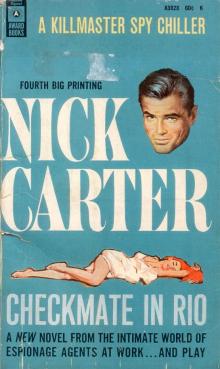 Checkmate in Rio
Checkmate in Rio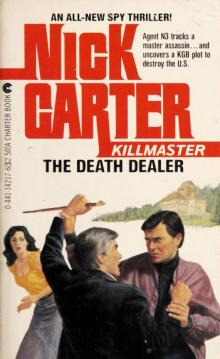 The Death Dealer
The Death Dealer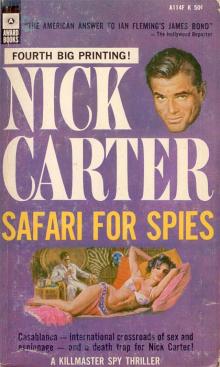 Safari for Spies
Safari for Spies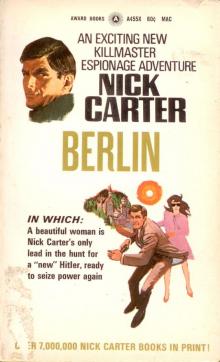 Berlin
Berlin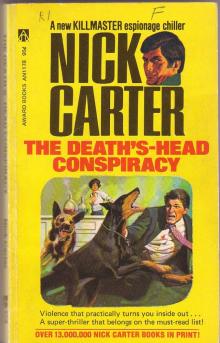 The Death’s Head Conspiracy
The Death’s Head Conspiracy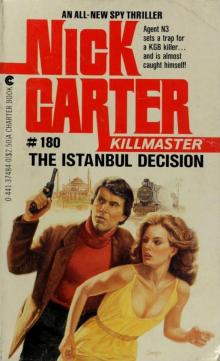 The Istanbul Decision
The Istanbul Decision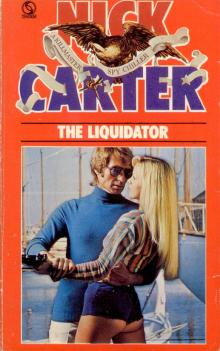 The Liquidator
The Liquidator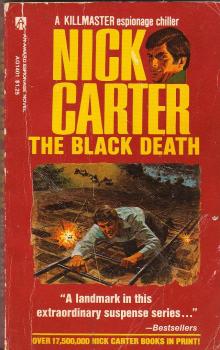 The Black Death
The Black Death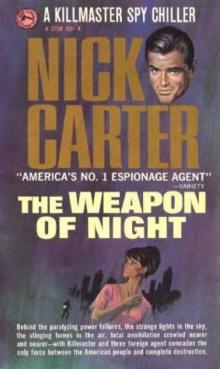 The Weapon of Night
The Weapon of Night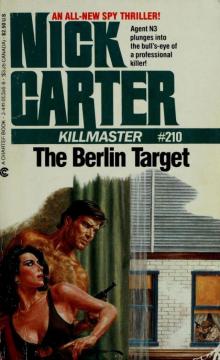 The Berlin Target
The Berlin Target Temple of Fear
Temple of Fear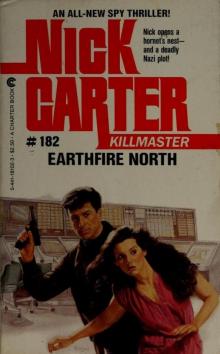 Earthfire North
Earthfire North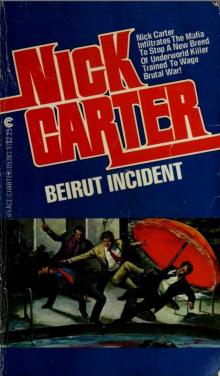 Beirut Incident
Beirut Incident White Death
White Death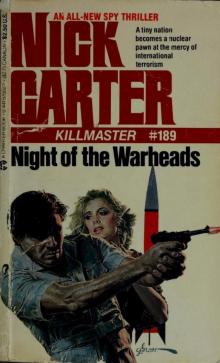 Night of the Warheads
Night of the Warheads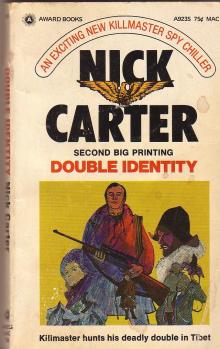 Double Identity
Double Identity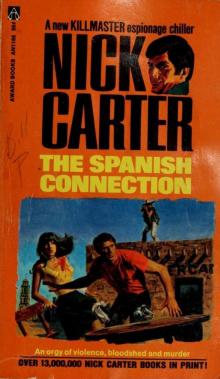 The Spanish Connection
The Spanish Connection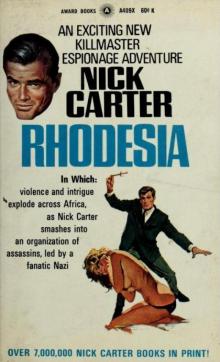 Rhodesia
Rhodesia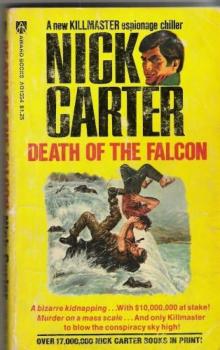 Death of the Falcon
Death of the Falcon The Executioners
The Executioners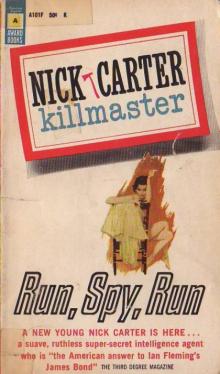 Run, Spy, Run
Run, Spy, Run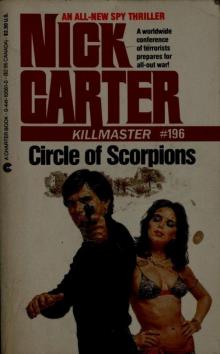 Circle of Scorpions
Circle of Scorpions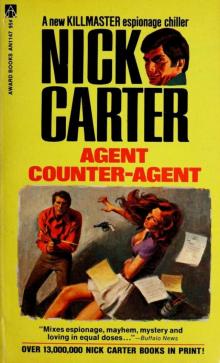 Agent Counter-Agent
Agent Counter-Agent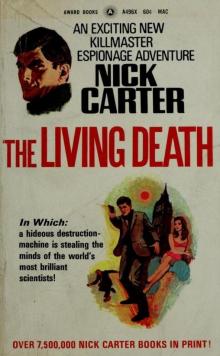 The Living Death
The Living Death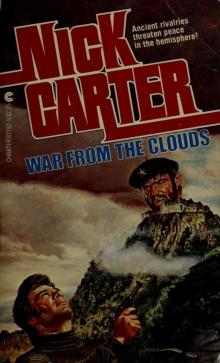 War From The Clouds
War From The Clouds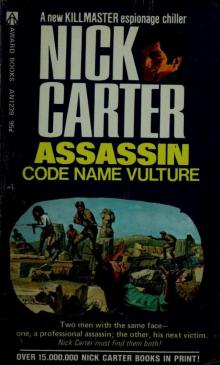 Assassin: Code Name Vulture
Assassin: Code Name Vulture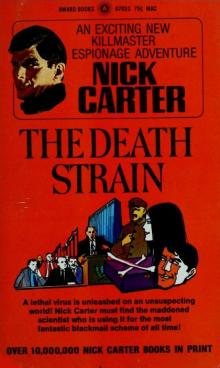 The Death Strain
The Death Strain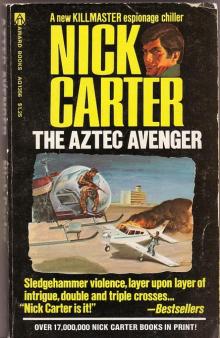 The Aztec Avenger
The Aztec Avenger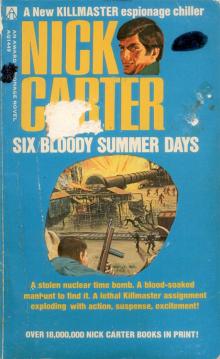 Six Bloody Summer Days
Six Bloody Summer Days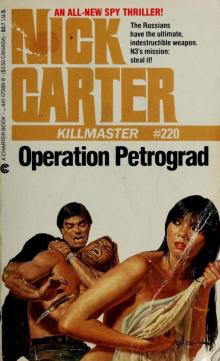 Operation Petrograd
Operation Petrograd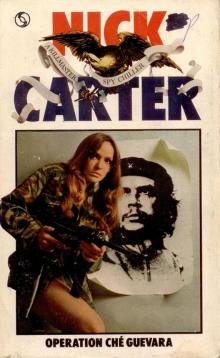 Operation Che Guevara
Operation Che Guevara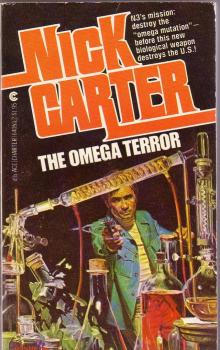 The Omega Terror
The Omega Terror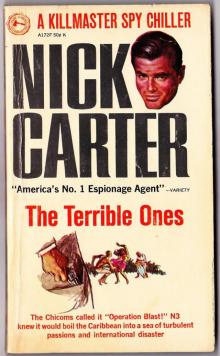 The Terrible Ones
The Terrible Ones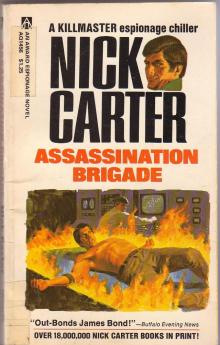 Assassination Brigade
Assassination Brigade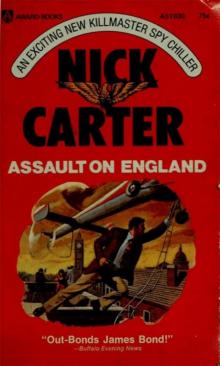 Assault on England
Assault on England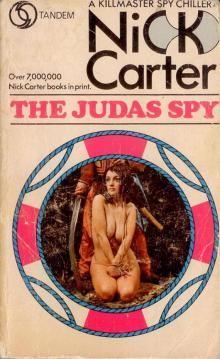 The Judas Spy
The Judas Spy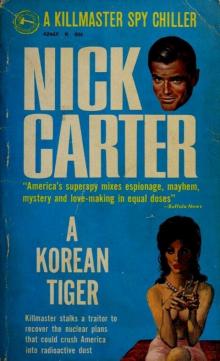 A Korean Tiger
A Korean Tiger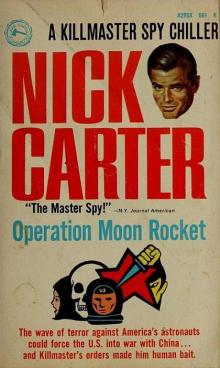 Operation Moon Rocket
Operation Moon Rocket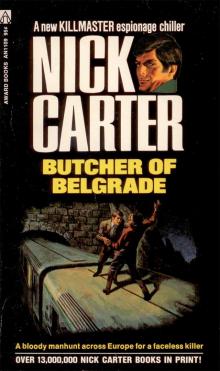 Butcher of Belgrade
Butcher of Belgrade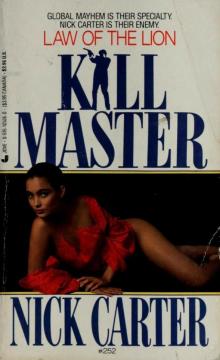 Law of the Lion
Law of the Lion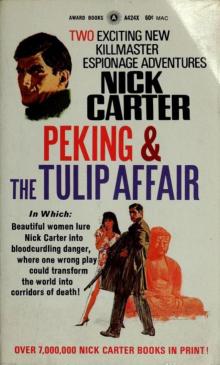 Peking & The Tulip Affair
Peking & The Tulip Affair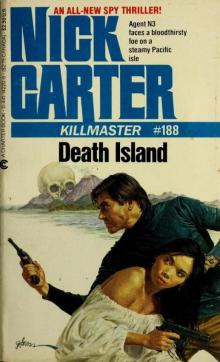 Death Island
Death Island The Jerusalem File
The Jerusalem File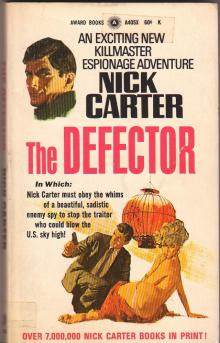 The Defector
The Defector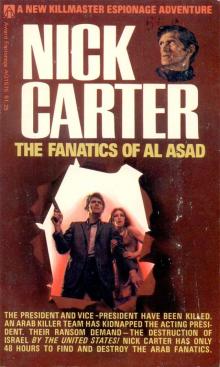 The Fanatics of Al Asad
The Fanatics of Al Asad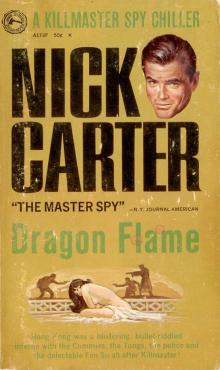 Dragon Flame
Dragon Flame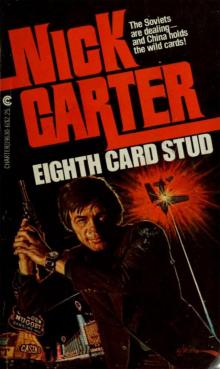 Eighth Card Stud
Eighth Card Stud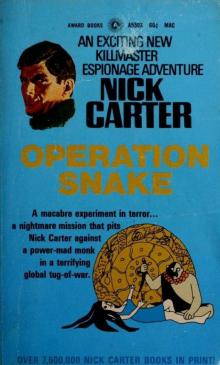 Operation Snake
Operation Snake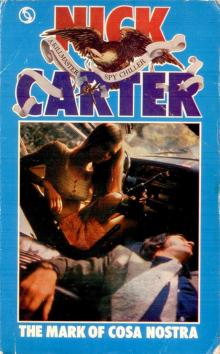 The Mark of Cosa Nostra
The Mark of Cosa Nostra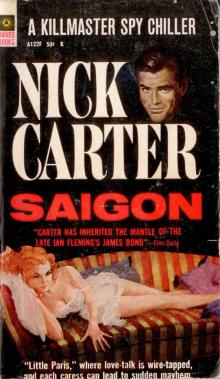 Saigon
Saigon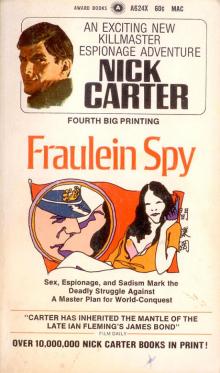 Fraulein Spy
Fraulein Spy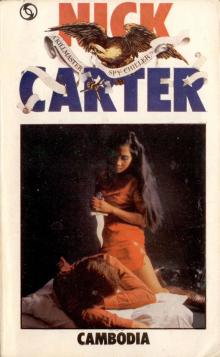 Cambodia
Cambodia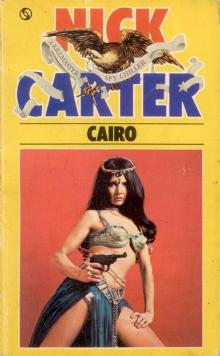 Cairo
Cairo